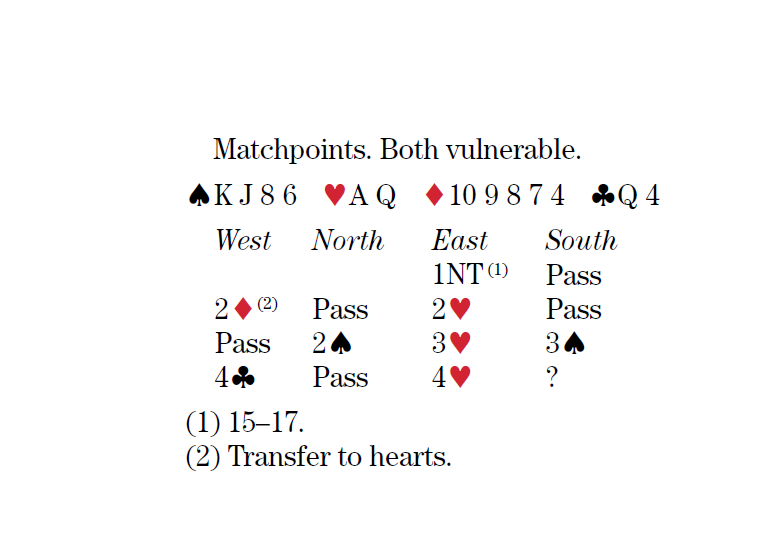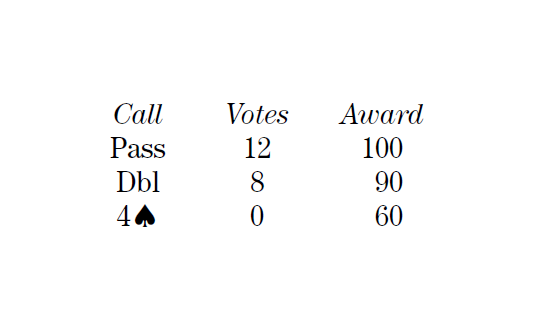
What’s your call?
| 4♠ | 4NT | |||
| 5♣ | 5♦ | 5♥ | 5♠ | 5NT |
| 6♣ | 6♦ | 6♥ | 6♠ | 6NT |
| 7♣ | 7♦ | 7♥ | 7♠ | 7NT |
| Dbl | Pass |
Pushed ‘em up and now what?
“Both double and 4♠ seem too unilateral,” explains Weinstein. “They could easily be making, or we could have a profitable save. By passing, we involve partner in the decision.”
Boehm, too, is interested in partner’s point of view. “It seems that 4♥ may be a lucky make, so I won’t double and bar partner. Maybe he can sniff a double fit for our side and bid a lucky 4♠.”
“Pass,” echo the Sutherlins. “Most East–West pairs are not going to be in game. 4♠ does not rate to make, and bidding it for a save will be a poor result. We have some cards and a good lead. Let’s defend.”
Lawrence claims he’s “happy (sort of)” that the opponents have bid to 4♥. “We do not rate to make 3♠, so getting a plus is a good result.”
“Partner succeeded in getting them two levels higher,” notes Hampson. “I will not punish us for pushing them to a game that the field may have bid on their own steam.”
Cohen’s analysis: “Plus 100 might be good enough if my partner stuck his neck out while a lot of the field our way is minus 140 against 2♥. Also, some Wests might have invited the first time, or some Easts might have pre-accepted, so I am no worse
off than on par with the field. In case 4♥ is cold, minus 620 might not be a disaster. But minus 790 will.”
“Pass,” bids Colchamiro. “Haven’t we done enough already? Who knows if they have a secondary fit in clubs?”
The Gordons pass. “If they make this, 4♠ will probably be ugly and we probably won’t get much for having pushed them anyway.”
Rigal will not go quietly. “Double and lead a spade. A bottom is only a bottom. Saving for minus 200 won’t get us any matchpoints, will it? So it is only if 4♠ is making that we need to
act. I’ve been wrong before.”
Meckstroth doubles, and points out: “It will probably be a lousy board if they are making this.”
Sanborn attacks, too: “I don’t think we are making 4♠, and a save would be a terrible matchpoint score if we go for minus 200. If they are down one and it is our hand for 3♠, I may as well protect my plus 140 and hope for plus 200. If they are making, we have a disaster board anyway.”
The Joyces double for the same reason: “We will try to protect our plus 140 in spades.”
“The opponents were passed out in two,” observes Meyers, poised with the red X. “We could be getting a really bad score for going down one in 4♥
undoubled if we are cold for 3♠. This is matchpoints.”
The Coopers are trapped into doubling. “We pushed them to this possibly cold game, so the zero we might get for 4♥ doubled making will be no rounder than for it making undoubled. We need to protect our plus 140 in 3♠.”

